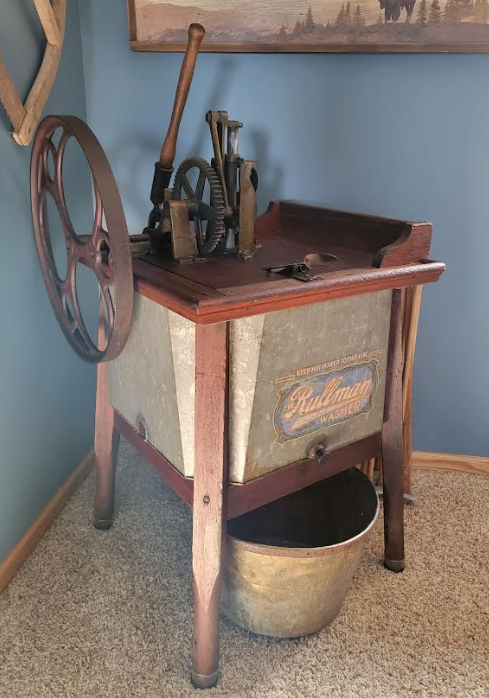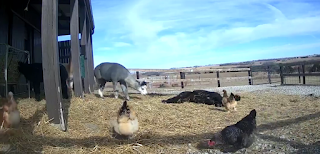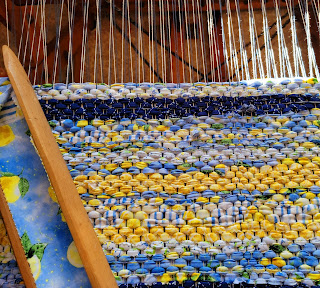It came to be on a sweltering early June day. The kind of day where the sun sits high in the sky, wavy lines of heat rise from the asphalt road. The cicadas slowly come to life, working hard to muster the energy in the heavy air to bolt out a few clicks to a potential mate before settling back down under a shady leaf. And the laundry on the line, hangs lazily, barely making an effort to dance in the breeze that refuses to lead.
It was just this day, that I found myself in the truck, about to make the same weekly trip to the feed store, the market, and the hardware store. The same truck, the same road, the same destination, a mind numbing routine. The weather making me indifferent to the whole prospect. As the truck hummed along I spied a small white sign on the corner of the gravel road, poking out of the already tall prairie grass. A siren's song on poster board with a red arrow and the simple words 'Barn Sale'.
Roused from my repetitive dusty trail, I turned the truck down the gravel road less traveled, a rooster tail of dust lazily rising behind me. I tried to temper my excitement, knowing that it could either be a marvelous adventure filled with treasure, or a bust, a barn filled with rusty junk that should have been sent to the dump decades ago. Farmers and ranchers rarely throw things away. You never know when you'll need that thing-a-ma-jig again, and why buy new later when you can simply save what you already have? Any you know what they say, 'one man's rubbish, is another man's treasure.' There was no harm in looking, and the road was in the general direction of errand anyway. If nothing else, it was a diversion and a chance to meet someone new, see a homestead close-up instead of from afar as you fly past.

Each passing crossroad brought be closer to the city, but another red arrow pointed me onward. My excitement peaked when I reached where X marked the spot. A lovely homestead I have always admired from afar as I would cut across country for a change of scenery. A ranch style home near the road, encircled by a protective copse of evergreen trees, strong, tall, sentinels guarding against the winter winds on the open prairie, off duty in the summer heat. A small wood clad outbuilding stands just off the driveway loaded with potted plants and the rusty detritus of farm life and discarded implements that have become yard ornaments. The main attraction was a large red gambrel barn, trimmed in white. I turned into the sale hoping for the best, but already happy that I was going to see this gem close up and not at 55 mph.
The sale was a driveway full of typical odds and ends and didn't go near the barn or sheds. On the property was a never before noticed large greenhouse, and its bounty was spread on large pieces of plywood on sawhorses, makeshift tables displaying hundreds of tomato plants seeking a new home, sleepy in the heat. The owners were kind, and seeing nothing I wanted, but not wanting to just show up and leave immediately, I wandered into the large three car garage. This was filled with bits and bobs, dusty boxes, outgrown children's toys and clothing. As I turned to make a final pass, my eyes quickly scanned a dark corner, piled high with baskets and rubbermaid containers, all partially covered with old blankets, and yet still part of the sale. Recognizing a familiar shape peeking out, I peeled back the blanket to an old Union 36. I could almost hear her weeping for joy for having been found, maybe I would rescue her? I looked her over quickly as my heart beat like a hummingbird. The more I looked, the
more my excitement was tempered.
 |
Missing pieces replaced
with bailing wire and
electrical tape. |
Years of sitting in the garage, dust and mice visiting, wild swings of temperature and humidity taking its toll. Every piece of metal was rusted. The beam was loaded with rotting and filthy warp. A started and abandoned rug lay crumpled on the breast beam. The once glistening maple, the pride of some 1930s housewife, now sat dull and lifeless, a shadow of its former glory. I looked at the price, inquired to the owner, and made a difficult decision. She would not be coming home. I had a loom. A beautiful cherry Norwood loom was at that very moment sitting in the studio waiting for me to finishing slaying a new tartan warp. As I turned to walk towards the truck, I swear I heard a faint weeping, the loom resigned to it's lonely fate.
 |
Rusty, covered in
droppings and grease
pencil notes. |
I'd be lying if I said I didn't give it a second thought that day, that week, or even that month. Could I save her? Would she even be there? I could do it. I refurbished antique sewing machines a long while ago, and a loom wasn't even that complicated. Nah, I had a loom already. Besides, where would I put it. Back and forth I would silently debate with myself. Slowly the thoughts faded completely.
At the beginning of December, I found myself at the first meeting of a newly formed fiber artists group. As I sat there in the shop, which was our meeting place, surrounded by restored looms, and spinning wheels, the old loom crept into my thoughts again. Like the Tell Tale Heart, it would not let me go. On the long drive home I decided to go the long way and stop by the farm and see if the loom was still there? The early winter sun, kissed the horizon as I turned unannounced into the driveway. I knocked at the door, but no one answered. Dismayed I turned toward the truck and was greeted by someone coming out of the shed. I asked if she had managed to sell the loom at sale, and if she hadn't did she still have it. She did!
She opened the garage door, and I swear I hear the little loom squeal with glee, 'you came back!"
We settled on a price, and I told her I would be back in the morning with the trailer and the check. The woman told me the story of how she bought it when they purchased the house 20 years ago, with good intentions of using it, but she never learned to use it, or even tackled cleaning it up or off in 20 years. The fabric was ancient, at least the mid 70s judging by the colors, so 45 years of sitting collection dust in one location or another.
I carefully wrapped her in a tarp for the drive home. If anything broke off, or rattled off on the way home, I wanted it to be contained for retrieval. When I got home, Doc helped me offload the loom into the main garage on the house. The thought being that it would be going in the house eventually, and being winter I wanted to avoid having to carry it all the way up the hill in a blizzard. I'd rather haul tools from the shop up to the garage to work. As we sat it on the floor, I looked at it and silently said to myself"what have I gotten myself into"?

But not only was I determined to tackle this project, I was determined to do it right, do it quickly, and do it on a budget. I would be thrilled with a week, but 10 days seemed more realistic. There was so much to do. All the metal needed either replaced or the rust dealt with. All the wood needed sanded down, fed, and then resealed. Missing pieces needed replaced. It all seemed like so much. How do you eat an elephant? One bite at a time.
I took photos like mad, after all, pixels are free. I looked at other looms online to see what I was missing.
I started taking it apart and carefully placed each item on paper I had taped to the floor. I labeled everything knowing I would forget what went where, but hoping I wouldn't.
The first task was taking off over 400 rotting warp threads and the old partial rug covered in dust, mouse droppings, dead bugs, and dead spiders. I went through the box after box of stripped fabrics, nothing newer than the mid-70s, some I actually recognized (remember yellow sheets with orange mums, daisies and mushrooms and butterflies on them?)These covered in mouse droppings and dust. (In retrospect, I should have masked and gloved for this, but hindsight, eh?) One box, better sealed than the rest contained musty books from the 70s, and 11 rug shuttles, and one boat shuttle and the two slaying tools. This was a treasure trove.
I sanded metal. I sanded wood. I visited the hardware store more times than I care to admit. Tiny achievements brought so much pleasure that I couldn't sleep for planning the next day.
I wanted to clean it up and fix it, but not to the point of erasing its past.
I left some of the decals that someone in the 60s proudly put on. I left the gnaw marks of a barn rat, and the scratches on one leg of a barn cat. The handmade replacement crank handle for the sectional beam, so lovingly crafted, was just as carefully repaired and re-installed.
The sanded maple wood was cleaned and stained a rich, warm chestnut.
The metal was sealed with a rust neutralizing black.
Missing pegs were re-crafted with the help of a 1940s steel pencil sharpener I have.
The rusted heddles were the last on my list. Their condition and sheer number made the project daunting. Do I simply purchase new and break my budget? Or do I soldier on and try to save them? I decided to try to save them. If I failed, then I would purchase new. I already saved the heddle bars with sanding and a light oiling. Now what to to with the heddles. I tackle my rusty cast iron before seasoning with vinegar, why not try it? 50 heddles at a time, my patience limit at the sink, went into a vinegar soak while I tackled other chores. I then rinsed and wiped the rust off each and every one, and set them out to dry. When I was finally done with them, I lightly sprayed the lot with a mist of oil, and again wiped each one down, leaving only enough to slow the rust. Although it would now be stored in a controlled environment, so I hoped the iron would be kept at bay for a long while.

I carefully reassembled the whole thing. At a critical juncture, just before I replaced the castle, the tallest piece, I decided to move it into the house. I decided on the library, by the window, where I would have plenty of daylight and could watch the world go by. I wrestled it onto a padded dolly, wheeled it out of the garage and down the sidewalk. I padded all the front steps and porch with garden blankets and slowly worked it towards the door. Even as wide as this modern door is, the loom still need to be on end, and then one side through the frame and then the whole thing rotated around and the other side to follow around. Once it was in the house, furniture sliders ruled the roost, and the process was repeated to get through the library door.
Once it was settled in, I began to reassemble in full. It was really nice to work in the warmth of the house with the radio for company.
I measured it for a new beam apron. Before she only had one bent piece of iron to draw up the warp. I stuck to my budget, and my refusal to drive into the city again, and raided my fabric studio for some cotton duck cloth. I opted for brass grommets for the warp ends to pass through, and left pockets for new, heavier steel rods (from the tractor store).
I added a beater brake to hold the beater for slaying.
I added a hook to hold tools.
I installed new pegs and risers.
The last challenge? Re-threading the heddles. They needed sorted, counted, divided in two groups for the two braces. They needed turned the same and correct direction and slid back onto the rails and then mounted back into their frames and the frames hung and balanced. I dreaded it, but it needed done.
The very last thing I did was add a plaque, my name and Refubrished in 2021.
Everyone, I'd like you to meet Fergus.
The Union 36 Loom was the premier rug loom of the time and was marketed to homeowners who wanted to make a little money on the side, or as a full time business. It even explained in the manual how to acquire rags, and how to set prices based on competition in the area and materials costs. They were manufactured from 1920-1940 and originally sold for $60 delivered. They came fully assembled and ready to use with a short amount of warp on the beam to help you get started. Now they can be found here and there, usually in poor condition and missing pieces, or heavily painted and in poor condition for around $200-450$ depending on condition. New, modern models (different company) start at over $1000, and the wood isn't a hardwood and is always done in natural light tones.

Side story. A chance trip to the local thrift shop graced me with a bent wood seat for piano. It adjusts height wise by twirling the seat one way or the other on a large iron screw. I refinished this at the same time a flat dark brown and repadded and covered the seat in a plaid wool scrap. Cost $20
Loom $150
Parts/supplies $58 (budget was $50), but I have bolts to return that will get me $15 back.
Odds and ends $60
Stool $20
Total - $273.00 and 42 hours (including clean up and putting tools away, but not shopping and drive time)

























































